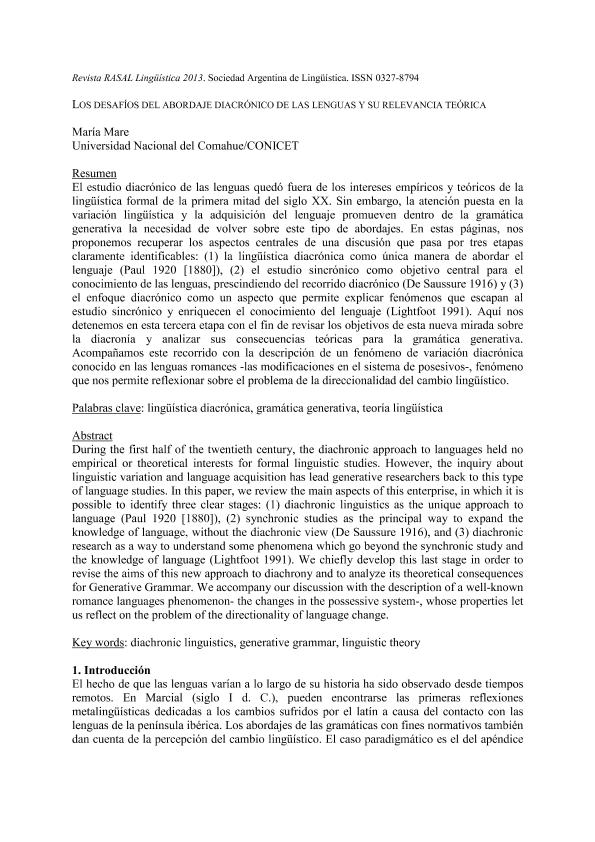Artículo
El estudio diacrónico de las lenguas quedó fuera de los intereses empíricos y teóricos de la lingüística formal de la primera mitad del siglo XX. Sin embargo, la atención que se pone en la variación lingüística y la adquisición del lenguaje promueven dentro de la gramática generativa la necesidad de volver sobre este tipo de abordajes de las lenguas. En estas páginas, nos proponemos recuperar los aspectos centrales de este recorrido que pasa por tres etapas claramente identificables: (1) la lingüística diacrónica como única manera de abordar el lenguaje (Paul 1880), (2) el estudio sincrónico como objetivo central para el conocimiento de las lenguas, prescindiendo del recorrido diacrónico (De Saussure 1916) y (3) el abordaje diacrónico como un aspecto que permite explicar fenómenos que escapan al estudio sincrónico y enriquecen el conocimiento del lenguaje (Lightfoot 1991). Aquí nos detenemos en esta tercera etapa con el fin de revisar los objetivos de esta nueva mirada sobre la diacronía y analizar sus consecuencias teóricas. Acompañamos este recorrido con la descripción de un fenómeno de variación diacrónica conocido en las lenguas romances -las modificaciones en el sistema de posesivos-, fenómeno que nos permite reflexionar sobre el problema de la direccionalidad del cambio lingüístico. During the first half of the twentieth century, the diachronic approach to languages held no empirical or theoretical interests for formal linguistic studies. However, the inquiry about linguistic variation and language acquisition has lead generative researchers back to this type of language studies. In this paper, we review the main aspects of this enterprise, in which it is possible to identify three clear stages: (1) diachronic linguistics as the unique approach to language (Paul 1920 [1880]), (2) synchronic studies as the principal way to expand the knowledge of language, without the diachronic view (De Saussure 1916), and (3) diachronic research as a way to understand some phenomena which go beyond the synchronic study and the knowledge of language (Lightfoot 1991). We chiefly develop this last stage in order to revise the aims of this new approach to diachrony and to analyze its theoretical consequences for Generative Grammar. We accompany our discussion with the description of a well-known romance languages phenomenon- the changes in the possessive system-, whose properties let us reflect on the problem of the directionality of language change.
Los desafíos del abordaje diacrónico de las lenguas y su relevancia teórica
Fecha de publicación:
2012
Editorial:
Sociedad Argentina de Lingüística
Revista:
Rasal Lingüística
ISSN:
0327-8794
Idioma:
Español
Tipo de recurso:
Artículo publicado
Clasificación temática:
Resumen
Palabras clave:
Lingüística Diacrónica
,
Gramática Generativa
,
Lingüística Teórica
Archivos asociados
Licencia
Identificadores
Colecciones
Articulos(CCT - PATAGONIA NORTE)
Articulos de CTRO.CIENTIFICO TECNOL.CONICET - PATAGONIA NORTE
Articulos de CTRO.CIENTIFICO TECNOL.CONICET - PATAGONIA NORTE
Citación
Mare, María de Los Angeles; Los desafíos del abordaje diacrónico de las lenguas y su relevancia teórica; Sociedad Argentina de Lingüística; Rasal Lingüística; 1; -1-2012; 41-58
Compartir




